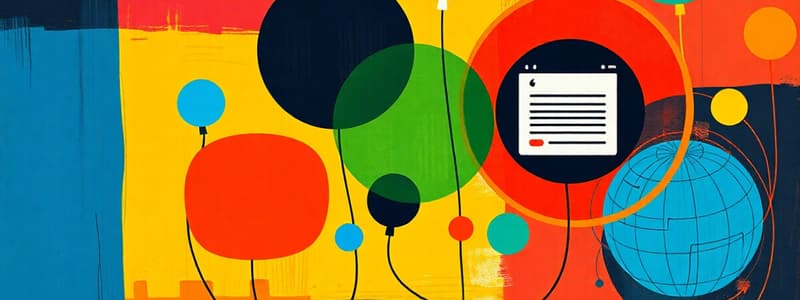Podcast
Questions and Answers
Which of the following is an example of a patent?
Which of the following is an example of a patent?
- A poem about nature
- A logo for a restaurant
- A new type of smartphone (correct)
- The ingredients of a soft drink
What type of intellectual property does a trademark protect?
What type of intellectual property does a trademark protect?
- Literary works like novels
- Unique identifiers of products or organizations (correct)
- Confidential business strategies
- Inventions and processes
What distinguishes a trade secret from other forms of intellectual property?
What distinguishes a trade secret from other forms of intellectual property?
- It is a copyrightable artistic or literary work.
- It can provide a competitive advantage if kept confidential. (correct)
- It requires registration with the government.
- It is publicly available information.
Which of the following statements best describes the Fair Use Policy?
Which of the following statements best describes the Fair Use Policy?
What is Media Literacy primarily concerned with?
What is Media Literacy primarily concerned with?
What is meant by 'Public Domain' in terms of intellectual property?
What is meant by 'Public Domain' in terms of intellectual property?
Which of the following best describes Information Literacy?
Which of the following best describes Information Literacy?
What does Technology Literacy entail?
What does Technology Literacy entail?
What is one of the three Cardinal Sins in the context of ethics?
What is one of the three Cardinal Sins in the context of ethics?
Which of the following represents a type of plagiarism?
Which of the following represents a type of plagiarism?
How are ethics and law distinguished in the context of media and information?
How are ethics and law distinguished in the context of media and information?
What constitutes Intellectual Property?
What constitutes Intellectual Property?
What is a major consequence of Privacy Breach?
What is a major consequence of Privacy Breach?
Flashcards are hidden until you start studying
Study Notes
Communication and Media
- Media functions as the vehicle or channel through which information is conveyed.
- Effective communication relies on the presence of media; absence leads to failure.
- Feedback from receivers is critical, varying based on the accuracy of the information received.
Media Literacy
- Defined as the ability to access, analyze, evaluate, and create meaningful media content.
- Involves understanding the appropriateness of media and the processes involved in its creation.
- Comprehending the motives behind media creation is fundamental to media literacy.
Information Literacy
- Refers to the ability to determine when information is needed and how to find and assess it.
- An information literate individual can:
- Identify specific information requirements.
- Locate necessary information.
- Critically evaluate information.
- Utilize information across various formats.
- Properly cite and reference sources.
Technology Literacy
- Encompasses the responsible and effective use of technology for diverse tasks and challenges.
- Integrates interaction with various media and access to information in responsible ways.
Ethics and Law
- Ethics originates from the Latin "Ethos," outlining preferred interaction styles among individuals.
- Laws consist of rules acknowledged and enforced within specific jurisdictions.
- Ethical dilemmas can occur even when actions are legally permissible, highlighting the distinction between legality and ethics.
Legal and Ethical Issues in Media
- Common issues include:
- Privacy breaches
- Dissemination of inaccurate information
- Plagiarism
Cardinal Sins in Information Management
- Falsification: Manipulating data to misrepresent information.
- Fabrication: Including non-existent data.
- Plagiarism: Unauthorized use of another’s work.
Types of Plagiarism
- Direct Plagiarism: Exact copying of text.
- Mosaic Plagiarism: Borrowing phrases without quotation or altering words while keeping original structure.
- Self-Plagiarism: Resubmitting one's own previous work without consent.
- Accidental Plagiarism: Unintentional lack of citations or quotation marks.
Intellectual Property (IP)
- Encompasses creative works such as inventions, and artistic expressions.
- Intellectual Property Rights (IPR): Protects creators from unauthorized use, typically limited in duration.
- In the Philippines, Republic Act No. 8293 safeguards individual and corporate rights regarding IP.
Types of Intellectual Property
- Copyright: Protects recorded works including literary, artistic, musical, and dramatic works.
- Patents: Grants exclusive rights for inventions (e.g., a new phone).
- Trademark: Protects brands, names, slogans, or symbols (e.g., Jollibee).
- Trade Secret: Refers to confidential business information providing competitive advantages (e.g., Coca-Cola's recipe).
Cybercrime
- Encompasses criminal activities involving computers, networks, or the internet.
Other Important Concepts
- Public Domain: Works not protected by law; available for unrestricted use.
- Creative Commons: Organization providing licenses for sharing copyrighted works under certain conditions.
- Fair Use Policy: Allows limited copying of copyrighted material for transformative purposes like commentary or parody.
- Infringement: Breach of intellectual property rights.
Studying That Suits You
Use AI to generate personalized quizzes and flashcards to suit your learning preferences.




